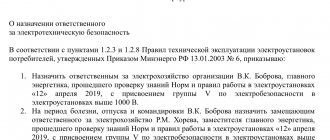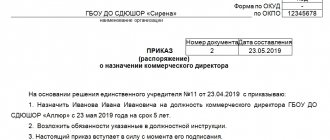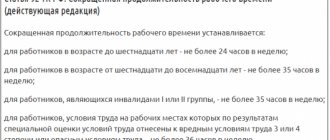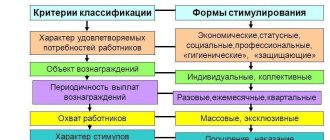A reprimand is an effective measure of influence on violators of labor discipline. In order to establish the procedure for the employee to perform job functions, the employer has in its arsenal such documents as an employment contract, job description, internal labor regulations and other local regulations. In fact, for one reason or another, an employee often violates the provisions approved by the organization. Depending on the nature, severity and frequency of violations, the manager has the right to apply disciplinary action. The article will discuss the procedure and also provide a sample order to issue a reprimand.
Procedure for applying penalties
The rules for applying a particular disciplinary sanction are described in Art. 193 of the Labor Code of the Russian Federation, according to which any punitive measure is accompanied by the issuance of a corresponding order. By law, before classifying an action as a misdemeanor, the employer is required to request an explanation from the employee who committed it. The refusal to give an explanation is recorded by drawing up an act and, according to Art. 193 of the Labor Code of the Russian Federation, cannot interfere with the application of disciplinary measures. The period for providing an explanatory note does not exceed two working days. In addition, the Labor Code provides for other terms for the application of penalties:
- no more than one month after discovery of the violation;
- no more than six months after the violation was committed;
- no more than two years after the discovery of the misconduct based on the results of an inspection by an auditor or auditor.
It is important to remember that, in accordance with the Labor Code of the Russian Federation, a reprimand as a disciplinary sanction can be applied once for one specific violation (Article 193 of the Labor Code of the Russian Federation).
Reprimand procedure
If an employee refuses to perform job duties or treats them irresponsibly, the employer must adhere to the algorithm for applying disciplinary action in the form of a reprimand:
- Record the fact of violation in the relevant act. It must be signed by two witnesses. They may be other employees.
- Request an explanatory note from the subordinate. He must provide it within two working days. If this was not done, the employer draws up a statement of lack of explanation.
- Draw up an order to issue a reprimand, indicating the reason, basis (a memo from another employee or an explanatory note from the violator), and the employee’s personal data.
- Give the order to the employee for review. He must put his signature on it. If he refuses to sign on it, a corresponding act is drawn up.
The basis for conducting a preliminary check before applying a penalty may be reports from other employees. Most often, they occur if the offender shifts his responsibilities to them, is often absent from the workplace for a long time, or does not do his work at all.
“At the initial stage, the manager must understand whether the actions of the subordinate are a violation or not. To do this, he needs to demand an explanatory note, and after analyzing the situation, make a final decision,” explains legal consultant of BKR-Intercom-Audit A.V. Ivanov.
The order to issue a reprimand does not have a unified form, but must contain the following information:
- Grounds: the fact of the violation itself, as well as reports from other employees and the violator’s explanatory note.
- Description of the situation for which the subordinate is reprimanded.
- Who is responsible for executing the order?
- FULL NAME. and signature of the director and other responsible persons.
If an employee refuses to provide an explanation or sign an order, this cannot be an obstacle to imposing a reprimand.
Practical examples
To understand the principles of applying disciplinary action in the form of a reprimand, it is worth familiarizing yourself with illustrative examples:
| Examples | Alternative Liability Options | Manager's actions |
| An employee is late for work several days in a row. | Comment. It is followed by a reprimand | Imposing a reprimand after an oral reprimand |
| Incorrect preparation of documents, as a result of which minor damage was caused to the company’s budget (unfair performance of labor functions) | Rebuke | Reprimand, obligation to pay the deficiency. A deduction is made from the salary, but the amount does not exceed the norms established by law |
| Damage to the company’s reputation among the consumer market due to improper performance of labor duties | Remark or reprimand | Reprimand and educational conversation |
This is interesting: Sample order to issue a reprimand for absenteeism in 2020
If we consider the specifics of applying a penalty in the form of a reprimand, you should pay attention to this example:
Warehouse accounting operator Shulgina O.S. violated the deadlines for drawing up accompanying documents, which resulted in the company’s failure to comply with the goods shipment schedule. This constitutes dishonest performance of labor functions, for which the employer, guided by Art. 192 and 193 of the Labor Code of the Russian Federation, applied a penalty to her in the form of a reprimand, drawing up an order and giving it to the violator for signature.
Rules for applying disciplinary sanctions
In Art. 192 of the Labor Code of the Russian Federation, a reprimand is mentioned as one of the types of punishment, along with reprimand and dismissal on appropriate grounds. But the legislative act does not clearly define this term and does not explain its difference from a remark. In practice, it is generally accepted that penalties are imposed for a violation of moderate severity. Sometimes heads of organizations or personnel department employees use the concept of a severe reprimand. This is probably done to enhance the effect of punishment on a psychological level, because this term has no relation to the Labor Code and is officially applied, for example, to employees in the armed forces of the Russian Federation.
The application of punitive measures, according to the law, is formalized by an order, which is presented to the employee for signature within three working days (Article 193 of the Labor Code of the Russian Federation). As an illustration, we give an example of a reprimand for improper performance of official duties.
When is a reprimand order issued?
A reprimand is a medium-severe type of disciplinary sanction, between a reprimand and dismissal. But this does not mean that a reprimand must be preceded by a remark, or that the employee cannot be reprimanded when the Labor Code of the Russian Federation even allows the employee to be fired. The employer establishes the procedure for applying reprimands to employees independently, taking into account the provisions of employment contracts, internal labor regulations, organizational and administrative documents of the employer, and, naturally, the severity of the disciplinary offense and the circumstances of its commission. The only important thing is that for a specific disciplinary offense only one disciplinary sanction can be applied (Part 5 of Article 193 of the Labor Code of the Russian Federation).
In general, a reprimand is applied for committing a disciplinary offense, that is, failure or improper performance by an employee, through his fault, of the work duties assigned to him (Part 1 of Article 192 of the Labor Code of the Russian Federation). This may include violation by an employee of legal requirements, obligations under an employment contract, internal labor regulations, job descriptions, regulations, orders of the employer, technical rules, etc. (Clause 35 of the Resolution of the Plenum of the Supreme Court dated March 17, 2004 No. 2).
Before drawing up an order to reprimand an employee (a sample is given below), the employer must require a written explanation from the employee. If after two working days the employee does not provide such an explanation, an appropriate act must be drawn up (Part 1 of Article 193 of the Labor Code of the Russian Federation).
Moreover, even if the employee does not provide an explanation, the employer, after two working days, may issue an order to reprimand for improper performance of official duties.
The employer is given 1 month from the date of discovery of the misconduct to issue an order for disciplinary action in the form of a reprimand. Such a day is considered the day when the employee’s immediate supervisor learned that the employee had committed a disciplinary offense. In this case, it does not matter that the direct manager, for example, does not have the right to impose a disciplinary sanction himself (clause 34 of the Resolution of the Plenum of the Supreme Court of March 17, 2004 No. 2). The monthly period does not include the time of illness of the employee or his vacation (Part 3 of Article 193 of the Labor Code of the Russian Federation).
This is important to know: Order to impose a disciplinary sanction: sample 2020
It is also important to take into account that a disciplinary sanction cannot be applied later than 6 months from the date of commission of the offense, and for an offense identified, for example, as a result of an audit, no later than 2 years from the date of commission (Part 4 of Article 193 of the Labor Code of the Russian Federation).
Making an order
The administrative act on imposing a disciplinary sanction includes a number of mandatory details:
- Name of the organization;
- details of the offender (full name, position);
- the essence of the incident (if possible, the exact time of the violation should be indicated);
- link to the article of the Labor Code;
- signatures of the employees involved (immediate supervisor, head of the HR department) and the director;
- the signature of the offender, which confirms that he is familiar with the order.
The employee must familiarize himself with the order within three days from the date of its publication. If he does not agree with the punishment and refuses to sign, he cannot be forced; he will have to draw up an act of refusal to sign.
Features of punishing an employee for violations
Let's look at how to reprimand an employee. Before taking active action, management should carefully analyze the situation. At this stage, it is very important to assess the severity of the offense. It is necessary to highlight the fact that, according to current regulations, an employer can apply only one form of punishment in relation to one offense. In the case where an employee commits several offenses, the head of the company can use several types of fines at the same time. A separate report must be drawn up for each employee’s misconduct.
When filling out the document, certain formalities must be observed. First of all, it is necessary to indicate the period of time when the employee violated discipline and the documents where this fact was recorded. Next, the chosen form of punishment is indicated, and the persons responsible for executing the order are listed. As a rule, this document is produced in a single copy, which is attached to the personal file. However, in some cases it may be necessary to prepare several copies, one of which is given to the punished worker.
Each company establishes the form of such a document independently and uses it in all cases of disciplinary action.
Order of reprimand
The right of management to take special measures against hired workers who violate the internal regulations of the company is enshrined in article one hundred and ninety-two of the law regulating labor relations. In order to issue a reprimand, the management of the organization should formulate an appropriate order or order. It is important to note that the current provisions of the law do not contain regulations governing the procedure for drawing up this act. This means that the general director is personally involved in developing the structure of the form, taking into account all the features of office work.
An employee who is reprimanded must be given an opportunity to explain his or her behavior. Many legal experts recommend that company leaders send written notice to employees demanding an explanation. Otherwise, the specialist may challenge the administration’s decision, saying that the authorities did not provide time to submit an explanatory note. If within two days from the date of transmission of this note the employee has not submitted an explanatory document, the management shall draw up an act of refusal to submit an explanatory document. This document is used as the basis for imposing fines in the form of a reprimand.
Order on material punishment
According to the current provisions of the law, the employer cannot use financial penalties that involve partial or complete deprivation of wages. This means that the company administration cannot introduce a monetary system of fines. The only exception to this rule are those companies that use a bonus scheme. In this case, the employee who violates the regulations may lose additional payments for a certain period. It is important to note that material punishment itself does not apply to disciplinary forms of influence. Despite this, many corporations use this type of penalties for violators of discipline.
It is also necessary to highlight the fact that the possibility of using this penalty must be enshrined in the collective agreement. A sample order to punish an employee in the form of deprivation of bonus payments must contain several mandatory points:
- Indication of the specific type of violation committed.
- The basis for the use of material punishment.
- Indication of the position and full name of the employee who violated the company’s internal regulations.
Order of disciplinary action
The contents of this document are practically no different from those described above. The content of the act must contain information about the nature of the identified violation. At this point, it is imperative to disclose the circumstances that helped identify the employee’s misconduct. Next, it is necessary to mention which of the regulations the particular worker violated. This could be an official instruction, fire safety standards, labor protection rules, or local company regulations.
In the content of the order, it must be mentioned that the employee was given a notice requiring him to provide an explanatory note. Next, you should make a reference to the law that allows you to use the selected type of disciplinary action. As a rule, this paragraph indicates the one hundred and ninety-second or one hundred and ninety-third article of the Labor Code. In the text part of this document, you can indicate that for the duration of the fine, the employee is deprived of additional payments in the form of a bonus or remuneration. The following indicates the persons who are obliged to familiarize the employee with the text of the document and fulfill the management’s requirements. Most often, these responsibilities are assigned to the management of the personnel department and accounting department.
The employer has the right to reprimand, reprimand or dismiss an employee who has not fulfilled his duties or performed them improperly.
Making a comment
Even in the case when such a form of disciplinary action as a reprimand is chosen against an employee, the employer must necessarily record the committed offenses. To do this, a report is drawn up that describes the circumstances of the situation that has arisen. Current laws require mandatory recording of time and place. After drawing up this act, the employee is sent a notification with a requirement to provide an explanatory note.
Refusal to submit an explanation is considered as a lack of compelling arguments for committing an offense. If a specialist provides an explanation, the head of the company must carefully analyze the current situation. The presence of undeniable arguments for deviation from internal regulations may become a reason for refusing to use educational measures.
A sample order to issue a remark to an employee is developed by the management of the document, indicating the main details of the company. The following is information about the employee who violated the internal regulations. The content of the order must indicate the basis for imposing penalties.
Consequences for the employee
When discussing violations of discipline and types of punishment, the question inevitably arises: does the reprimand received at work have consequences? Contrary to popular belief, information about reprimand is not subject to entry into the work record book, and therefore does not become known to another employer. This is evidenced by Art. 66 Labor Code of the Russian Federation. A reprimand entered into a personal file at the document level implies the issuance of an order. In addition, the employee responsible for personnel records has the right (but is not obligated) to record the fact of the violation in the violator’s personal card. In fact, the presence of such a penalty may be a factor in subsequent dismissal. Clause 5 Art. 81 of the Labor Code of the Russian Federation states that the employer has the right to terminate the employment relationship with the employee if there is a fact of “repeated failure by the employee to fulfill his duties if he has a disciplinary sanction.” In this case, an entry is made in the work book with a link to the above article of the Labor Code.
For what violations is a reprimand applied?
When determining the form of disciplinary action, the employer should take into account the severity of the offense, the degree of guilt of the employee, the employee’s personality characteristics and external factors, in accordance with Part 5 of Art. 192 TK.
A reprimand is considered an “average” punishment, in terms of severity. The most severe form of punishment is dismissal, the least severe is reprimand . You cannot use two forms of recovery at the same time. But financial responsibility and disciplinary responsibility do not overlap. Therefore, if the result of the employee’s actions or inaction was causing damage to the employer, then he has the right, in addition to a reprimand, to recover compensation from the employee.
The employer must choose a measure of responsibility for the employee that is adequate to the unlawful act committed. Rules that may entail one form or another of penalties may be specified in internal documentation.
In order for an employer to have grounds to reprimand an employee, the rules for observing labor discipline must be documented in a job description, employment contract or other document. The employee must familiarize himself with them, which he confirms with his signature.
Examples of offenses eligible for reprimand include the following:
- Late for work.
- Late departure from lunch.
- Absence from work without reason.
- Failure to complete safety training.
- Refusal of medical examination.
- Appearing in an indecent condition or appearance.
- Embezzlement.
- Violation of labor functionality.
- Failure to follow management orders.
Features of the application of punishment
The main purpose of applying disciplinary action is to prevent other offenses that may be committed by an employee of the enterprise in the future. If a person who has already been reprimanded commits any violations again, he may be fired. At the same time, representatives of the labor inspectorate will not be able to protect him from such negative consequences.
Art. 192 of the Labor Code contains information about what kind of disciplinary sanction can be applied to an employee. Any type of punishment can be used only if there is evidence of the guilt of a particular specialist. The easiest reprimand is one that can be made orally or in writing.
Consequences of receiving a reprimand for an employee
The presence of a reprimand may serve as grounds for deprivation of a bonus, although the Regulations on bonuses must also be taken into account here, if such exists in the company. However, they cannot cut the salary of an employee who has received a reprimand, since this is contrary to the essence of the disciplinary sanction and the law.
The reprimand is valid for a year, after which the employee is considered to have no disciplinary sanction, although the employer, if desired, can remove the sanction earlier by formalizing this action with a separate order. Repeated failure by an employee to fulfill his official duties in the presence of a valid reprimand may become the basis for the application of a more stringent type of punishment - dismissal.
Thus, reprimanding an employee is an exercise of the employer’s right to punish him for failure to fulfill his job duties. To apply this disciplinary sanction, you must adhere to the procedure established in the Labor Code of the Russian Federation, because otherwise the employee will have reasons to challenge its legality. At the same time, the employer must remember that he has only a month from the date of discovery of the misconduct to issue a reprimand.
Severe reprimand for failure to fulfill official duties - Labor Code of the Russian Federation
Article 192 of the Labor Code of the Russian Federation contains a list of acceptable disciplinary sanctions for employees in Russia. When drawing up labor documents, you need to rely on this article of the labor code. However, it states that local regulations allow certain other penalties if the charter or other document clearly states violations and responsibilities.
In practice, a strict reprimand can be given if material damage was caused by improper actions and failure to fulfill official duties.
Labor Code of the Russian Federation - Article 192
Severe reprimand - consequences for the employee
This punishment from the Labor Code does not have major consequences for the employee. However, if such punishment is repeated within the period established by the Labor Code of the Russian Federation, dismissal may already be applied.
This consequence is considered the most severe of all possible. Therefore, employees are advised not to miss the deadline for appeal, and if there are valid reasons, to file a complaint.









